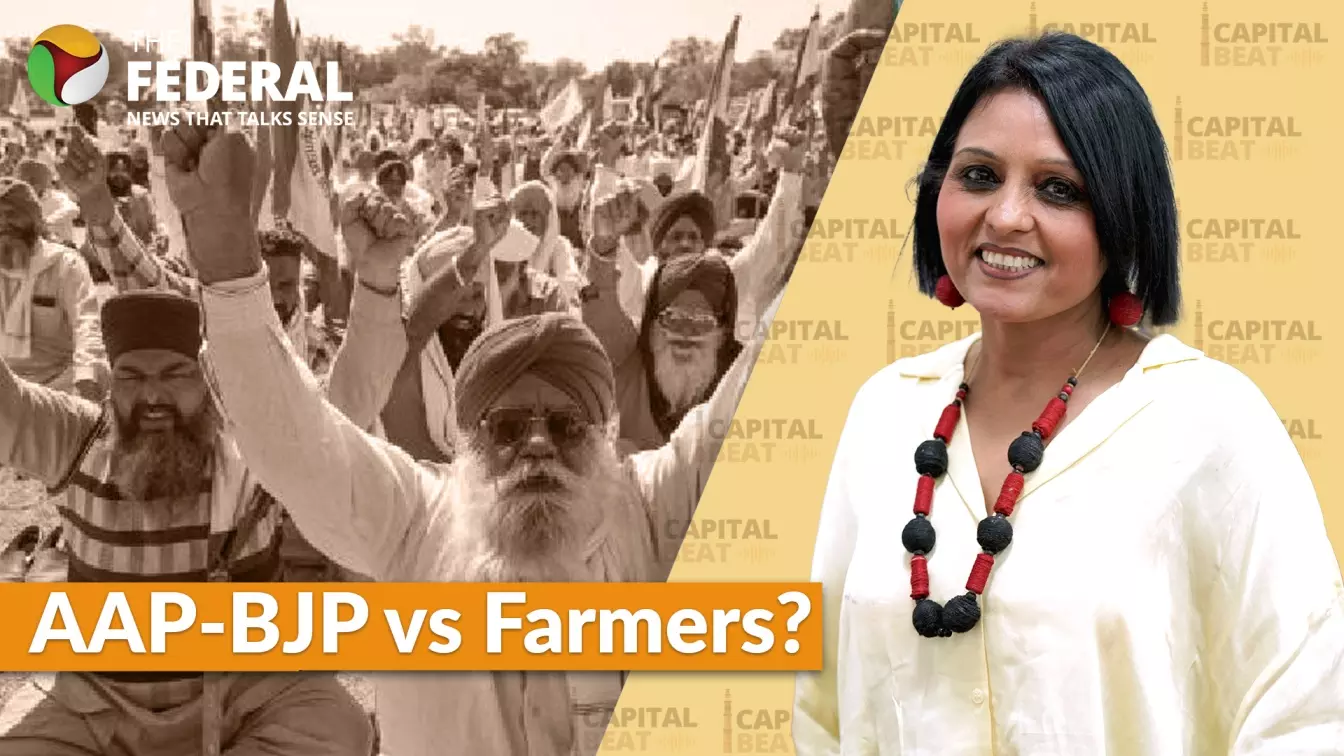
Farmers' protest
Will backlash against Punjab govt crackdown on farmers lead to bigger agitation?
Punjab farmers are threatening to escalate their protests after a major police crackdown at the Shambhu and Khanauri borders

In the latest episode of Capital Beat, farmer leader Gurpreet Singh Sangha, veteran journalist Jagdeep Singh Sindhu, and political commentator Harpreet Bajwa joined the discussion on the Punjab farmers' protests. With escalating tensions at the Shambhu and Khanauri borders, the panel examined the political impact of the crackdown on Punjab’s agrarian movement. Farmers allege that the Aam Aadmi Party (AAP) and the Bharatiya Janata Party (BJP) have worked together to suppress the agitation, while the Congress sees an opportunity to regain political ground.
Shambhu border crackdown: What happened?
The Punjab police forcefully evicted farmers from the Shambhu and Khanauri borders, using earth-moving machines to dismantle blockades. The roads—closed for nearly a year due to the farmers’ sit-in—were reopened, triggering a strong backlash from farmer unions. Several leaders, including Jagjit Singh Dallewal, were arrested and detained. The farmers, who had initially engaged in peaceful talks with Punjab Chief Minister Bhagwant Mann, now claim they have been betrayed by both the state and central governments.
Also read: Two anti-farmer parties have joined hands: Kharge on protest crackdown
According to Gurpreet Singh Sangha, “The Punjab government facilitated talks between the Centre and farmers, yet after the discussion, the moment farmers re-entered Punjab territory, they were picked up by the police. This is a breach of democratic norms.”
Political blame game and allegations
The panelists pointed out that the Punjab government’s actions have raised serious questions about governance. Sangha accused the AAP of being an ally of the BJP, working to systematically weaken the protest. “The AAP government has done everything at the behest of the BJP—be it arresting leaders, refusing transparency, or suppressing dissent,” he said.
Jagdeep Singh Sindhu echoed this sentiment, stating, “The divide-and-rule strategy has been played very effectively. The government attempted to bring in a parallel farmer body (SKM-India) to dilute the movement, but this was rejected outright.”
Despite strong denials from the government, the farmers say there is a widening trust deficit between them and the AAP-BJP establishment. This has created an opening for the Congress, which has been vocal against the crackdown, leading protests in Parliament.
Also read: After police crackdown, Shambhu border wears deserted look
Farmers call for national agitation
Following the crackdown, the farmers are now considering a larger, national-level protest. Sangha revealed that leaders from other states are uniting, making it a multi-state movement. “This is no longer a Punjab issue; Haryana, Uttar Pradesh, and other states are also feeling the heat. The next course of action is to mobilise nationwide.”
Sindhu added, “This has shaken the farmer unions across India. Leaders are discussing aligning with trade unions and student movements to strengthen their resistance against government policies.”
AAP-BJP alliance theory
Panelist Harpreet Bajwa highlighted that Punjab’s political landscape is shifting, with AAP increasingly alienating rural voters. “AAP came to power with farmer support, but their crackdown has changed the narrative. The rural belt, once their stronghold, is turning against them,” he explained.
Bajwa suggested that AAP’s actions mirror BJP’s social engineering tactics used in Haryana—attempting to divide voter bases along rural-urban and caste lines. “The crackdown has fueled speculation that AAP and BJP are working together, aiming to re-engineer Punjab’s electoral landscape,” he added.
What next? Will farmers march to Delhi again?
With Haryana now removing barricades that previously blocked farmers from entering Delhi, Sangha hinted at a possible return to the capital. “Now that the Haryana government has lifted restrictions, we may march to Delhi once more. The government thought they crushed the movement, but they have only dismantled the barricades, not the spirit,” he declared.
Also read: Farmers evicted, Haryana forces remove barricades to clear Shambhu-Ambala road
While immediate large-scale mobilisation might take time, Sindhu believes this crackdown has strengthened the farmer movement. “The betrayal is now clear. Farmers won’t forget this. This protest is evolving into something bigger than before,” he warned.
A deepening crisis
With elections approaching, Punjab’s agrarian protests are set to become a major political issue. The Congress is looking to capitalise on the farmers' anger, while the AAP and the BJP attempt damage control. As talks remain stalled and trust between the government and the farmers erodes, a larger, more unified agitation seems inevitable.
(The content above has been generated using a fine-tuned AI model. To ensure accuracy, quality, and editorial integrity, we employ a Human-In-The-Loop (HITL) process. While AI assists in creating the initial draft, our experienced editorial team carefully reviews, edits, and refines the content before publication. At The Federal, we combine the efficiency of AI with the expertise of human editors to deliver reliable and insightful journalism.)

